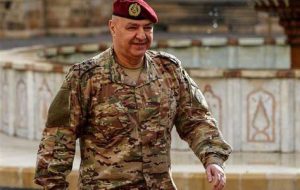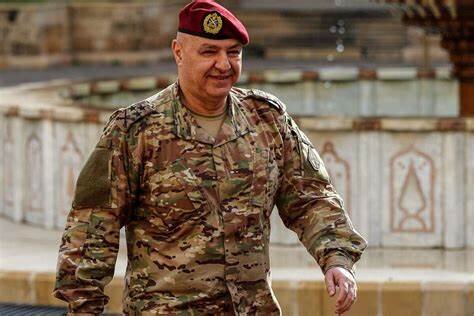General Joseph Aoun elected Lebanon’s 14th president
After more than two years of presidential impasse following the end of former President Michel Aoun’s term, the Lebanese Parliament elected Army Commander Joseph Aoun as the 14th President of the Lebanese Republic. Joseph Aoun, the commander of the Lebanese Army, now holds the presidency, following the terms of his predecessors: Emile Lahoud, Michel Suleiman,


After more than two years of presidential impasse following the end of former President Michel Aoun’s term, the Lebanese Parliament elected Army Commander Joseph Aoun as the 14th President of the Lebanese Republic.
Joseph Aoun, the commander of the Lebanese Army, now holds the presidency, following the terms of his predecessors: Emile Lahoud, Michel Suleiman, and Michel Aoun.
This came after the Lebanese parliamentarians’ vote on Thursday, where they failed to secure the necessary two-thirds majority (86 votes) in the first round of voting earlier in the day, which is required for a candidate to win.
In the second round, they successfully elected the president following a two-hour break, during which Aoun reportedly met with the heads of the Loyalty to the Resistance and Development and Liberation blocs for more than an hour.
After 71 deputies voted for the army commander in the first round, he won in the second round, with 99 recorded votes.
It is worth noting that all 128 Lebanese representatives participated in the presidential election, with ambassadors from several countries in attendance, including those of the United States, Saudi Arabia, Iran, Qatar, Egypt, and China.
Pledge to rebuild trust in Lebanon
Lebanon’s newly elected President Joseph Aoun has pledged to usher in a new chapter in the country’s history, emphasizing unity, justice, and institutional reform as key pillars of his presidency. Speaking to the nation following his election, Aoun delivered a series of statements outlining his vision for Lebanon’s future.
“We are a brave people, resilient in the face of adversity. No matter our differences, in times of hardship, we come together,” Aoun declared. “If one of us falls, we all fall.”
The president-elect promised to work with unwavering dedication to rebuild trust in the Lebanese state. “Today marks the beginning of a new phase in Lebanon’s history. My pledge is to serve the state of Lebanon with integrity,” he affirmed.
Aoun stressed the need for impartiality and accountability in governance, vowing, “There will be no immunity for criminals, corrupt individuals, or perpetrators. Justice will be the ultimate arbiter.” He further committed to upholding the constitution, saying, “I pledge to challenge the constitutionality of any law that violates the charter and to respect the separation of powers.”
The president-elect also outlined plans to restructure public administration and implement rotation in senior positions across institutions. “My pledge is to reform public administration and to adopt a rotation policy for executive positions,” he said.
Aoun underscored the importance of strengthening Lebanon’s sovereignty and security. “As the Commander-in-Chief of the Armed Forces, I pledge to uphold the state’s exclusive right to bear arms,” he stated. He also called for investing in the Lebanese Army to combat terrorism and prevent Israeli aggression. “We must invest in our military to safeguard our borders and protect against external threats.”
Reiterating his commitment to Lebanon’s independence, Aoun declared, “We will not compromise on Lebanon’s sovereignty or independence. Our unity is our shield against adversity.” He urged reliance on internal strength rather than foreign powers, saying, “The time has come to devote our focus solely on Lebanon, not on external forces to gain advantages over one another.”
Aoun also advocated for pragmatic dialogue with neighboring Syria to address shared issues. “We have an opportunity for meaningful and respectful dialogue with Syria to resolve mutual concerns,” he said. He emphasized an openness to balanced relations with both the East and West, based on mutual respect.
Aoun pledged to prioritize social security networks and safeguard freedoms. “I will work to strengthen social safety nets and to respect freedom of the press and expression within constitutional frameworks,” he stated.
He concluded with a sense of urgency and determination, declaring, “There is no time to waste. My commitment is to defend the public interest and the rights of all Lebanese.”
Who is the 14th President of the Lebanese Republic?
Joseph Aoun has served as the Commander of the Lebanese Army since March 8, 2017, succeeding General Jean Kahwaji. His military career began in 1983, marking the start of his long service in the army.
He was promoted to Brigadier General in 2013 and continued to rise through the ranks, achieving the rank of General in 2017. That same year, he was appointed Commander of the Army, leading during one of the most sensitive periods in Lebanon’s history.
Lebanon faced significant security and political challenges during this period, including the notable “Dawn of the Outskirts” battle in 2017. In this operation, the Lebanese Army, in cooperation with Resistance forces, fought against terrorist organizations on the outskirts of the towns of Arsal and al-Qaa, located on the Syrian border.
The country also faced significant security challenges following the outbreak of protests on October 17, 2019, and the prolonged Israeli war on Lebanon in 2023, which lasted over 60 days. These events placed new responsibilities on the Lebanese Army, particularly with the signing of the ceasefire agreement.
(Source: Al Mayadeen)
